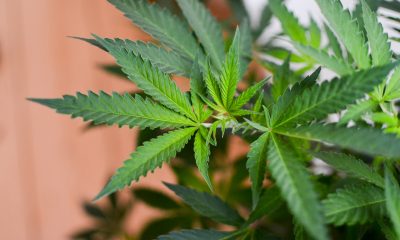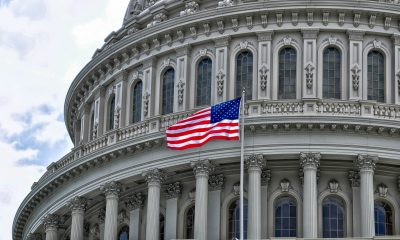Politics
GOP Senator Urges Border Patrol To ‘Reverse’ Marijuana Employment Policy Change, Arguing Loosening Rules ‘Undermines’ Security

A GOP senator is calling on U.S. Customs and Border Protection (CBP) to “reverse” its updated policy that narrows the window of employment ineligibility over past marijuana use from two years to three months, arguing that it “undermines the security and integrity of the Border Patrol workforce” and questioning the “trustworthiness” of recruits who used cannabis.
In a letter sent to CBP Acting Commissioner Troy Miller on Sunday, Sen. James Lankford (R-OK) said he’s “very concerned about the impact” of the modest reform, which he said “flatly contradicts Border Patrol’s mission to protect our nation against illegal drugs.”
It’s not clear when the CBP employment policy was revised, but the senator said his staff learned about it at a briefing last month.
“CBP briefers reported to my staff that this policy change was precipitated in part because of confusion between Federal law and state law in states where marijuana has been legalized,” he wrote. “However, as a Federal agency, CBP should ensure its personnel comply with Federal law regarding the illicit or otherwise prohibited use of controlled substances.”
Lankford said that CBP briefers reported that people who admit to past cannabis use “often admit to other disqualifying criminal conduct,” which he said is “not surprising” because, regardless of state laws, “users often obtain ‘gray market’ marijuana sold by unlicensed sellers due to its lower price.”
He also alleged that licensed cannabis businesses are “often are riddled with corruption,” citing reports of issues in his state’s medical marijuana program, where he said undocumented immigrants are used for labor and “trafficked into horrible situations at these grows.”
I’m calling on Acting Commissioner Miller to immediately reverse the policy that lowers the threshold for recent marijuana use for recruits.
Read more ⬇️ pic.twitter.com/cjAIXPUgEe— Sen. James Lankford (@SenatorLankford) April 8, 2024
Finally, the senator said in the letter, first reported by Fox News, that there’s a link between cannabis use and “schizophrenia and psychosis,” despite conflicting research about that association.
“Guidelines regarding suitability and background investigations for Federal employment note that the Federal government screens for psychological issues and for illicit drug usage,” he said. “Frequent, regular usage of marijuana in a state where marijuana has been legalized could significantly impact a Border Patrol recruit’s trustworthiness, particularly given the incidence of psychosis among heavy marijuana users.”
“Reducing the lookback on marijuana usage increases the possibility that a recruit to Border Patrol could have paid a transnational criminal organization for marijuana grown illicitly by illegal immigrant labor,” Lankford said. “This situation directly contradicts Border Patrol’s mission and could create concerning security and integrity issues for agents.”
“As the Ranking Member of the Subcommittee on Governmental Operations and Border Management, my Subcommittee retains jurisdiction over Federal hiring and border management. I am gravely concerned that this policy change undermines the security and integrity of the Border Patrol workforce. Accordingly, I ask that you rescind this policy and restore the two-year lookback on marijuana usage among Border Patrol recruits.”
The senator then listed 11 questions he’s asking CBP to answer by May 7, including inquires about evidence used to support the cannabis policy change, the impact on “polygraph passage rates” and any other revisions to employment standards that have been implemented concerning past cannabis use.
The overall message is clear, though. Despite CBP’s longstanding recruitment issues and Lankford’s recognition of the problem, including his push for border security legislation that he said would increase the agency’s workforce, he thinks hiring people who might’ve used cannabis three months ago instead of two years poses too grave a threat.
Meanwhile, last year, CBP cautioned employees, as well as their family members, against using even federally legal CBD products.
The federal legalization of hemp and its derivatives has also created complications for CBP’s enforcement activity, leading officials to seek out portable marijuana analyzers to quickly identify cannabinoid profiles and help distinguish between marijuana and hemp.
Lankford’s opposition to policy change isn’t especially surprising, as the senator has a longstanding reputation as a staunch prohibitionist. Last September, for example, he led a separate letter to the head of the Drug Enforcement Administration (DEA), urging the agency’s to “reject” a recommendation to reschedule cannabis.
Read the senator’s letter to CBP on the agency’s cannabis employment policy below:
Marijuana Company Claims DEA Review Process Is Unconstitutional In New Federal Lawsuit
Photo courtesy of Martin Alonso.
















